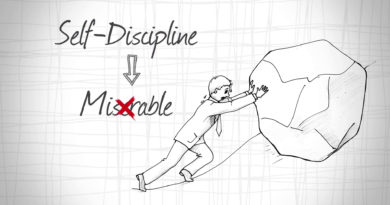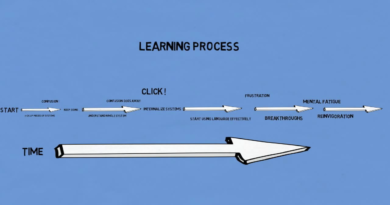Neste vídeo, com 5m15s de duração, são apresentados três exercícios muito simples para parar de traduzir mentalmente antes de falar em inglês. São eles:
- Criar sentenças mentalmente;
- Prepare antecipadamente as sentenças que usará em alguma situação;
- Faça uma revisão do seu dia antes de dormir.
A ideia principal do vídeo é que ao fazer estes exercícios você irá aumentando gradativamente a sua fluência ao criar um estoque de frases que poderá usar em diversas situações.
Importante, os três exercícios devem ser feitos todos os dias para que tenham efeito.
| English Transcript | Tradução |
|---|---|
| I can speak English, but before I say anything, I have to make a sentence in my native language, translate that into English, and then say it. | Eu posso falar inglês, mas antes de dizer qualquer coisa, tenho que montar uma frase em meu idioma nativo, traduzi-la para o inglês e depois dizê-la. |
| I feel like I'm not speaking fluently because of this. | Sinto que não estou falando fluentemente por causa disso. |
| That is one of the most common complaints I hear from my students. | Essa é uma das reclamações mais comuns que ouço dos meus alunos. |
| So in this lesson, I'm going to teach you three exercises that will help you to stop translating in your head. | Portanto, nesta lição, vou ensinar três exercícios que te ajudarão a parar de traduzir em sua cabeça. |
| These exercises will make you think 100% in English and speak fluently without hesitation. | Esses exercícios te farão pensar 100% em inglês e falar fluentemente sem hesitar. |
| So, let's jump right into it. | Então, vamos pular direto para ele. |
| Here is exercise number one: Make sentences in your head. | Aqui está o exercício número um: Faça frases em sua cabeça. |
| This is the number one fastest way to start thinking in English. | Esta é a maneira mais rápida de começar a pensar em inglês. |
| Throughout your day, make sentences about what is happening around you. | Durante o dia, faça frases sobre o que está acontecendo ao seu redor. |
| For example, let's say that you're sitting on the bus and you're going somewhere. | Por exemplo, digamos que você está sentado no ônibus e está indo a algum lugar. |
| In your head, you can start talking in English ? "I like this seat, it's nice and comfortable." | Na sua cabeça, você pode começar a falar em inglês: "Eu gosto deste assento, é agradável e confortável." |
| Look at that couple sitting over there, what are they doing? | Olhe aquele casal sentado ali, o que eles estão fazendo? |
| They look very happy. | Eles parecem muito felizes. |
| They're joking and laughing about something. | Eles estão brincando e rindo de alguma coisa. |
| Anyway, let's look out the window. | De qualquer forma, vamos olhar pela janela. |
| Oh, what a beautiful park. | Oh, que belo parque. |
| I wish I could visit it sometime. | Eu gostaria de poder visitá-lo em algum momento. |
| And so on. | E assim por diante. |
| You can do this in any situation: when you're at home, when you're bored at work or school, when you're waiting at the doctor's office, when you're walking in the park and so on. | Você pode fazer isso em qualquer situação: quando estiver em casa, entediado no trabalho ou na escola, quando estiver esperando no consultório médico, quando estiver andando no parque e assim por diante. |
| And it will train your brain to make sentences in English. | E isso treinará seu cérebro para montar frases em inglês. |
| Now, while you are doing this, if you start translating, it's OK - don't get disappointed, because as you keep practicing, you will collect more and more sentences for everyday situations, and over time, you will translate less. | Agora, enquanto estiver fazendo isso, se você começar a traduzir, tudo bem - não fique desapontado, porque, ao continuar praticando, você coletará mais e mais frases para situações cotidianas e, com o tempo, traduzirá menos. |
| Remember to do this exercise many times every day - make it a habit to regularly make sentences in your head. | Lembre-se de fazer esse exercício várias vezes ao dia - crie o hábito de fazer frases regularmente em sua cabeça. |
| Exercise number two is prepare sentences for conversations. | O exercício número dois é preparar frases para conversas. |
| For this exercise, think about a conversation that you are going to have in the future, and come up with sentences that you can use. | Para este exercício, pense em uma conversa que você terá no futuro e crie frases que possa usar. |
| For example, if there's going to be a meeting in your workplace tomorrow, what would be some useful sentences? | Por exemplo, se houver uma reunião no seu local de trabalho amanhã, quais seriam algumas frases úteis? |
| Well, if you're going to present an idea to your colleagues, you might say "I strongly believe this will help our sales." | Bem, se você vai apresentar uma ideia aos seus colegas, pode dizer "Acredito firmemente que isso ajudará nossas vendas". |
| a-ha! | a-ha! |
| Keep that in mind to use tomorrow. | Tenha isso em mente para usar amanhã. |
| Maybe you have a colleague (let's say his name is Teddy) and he always interrupts you while you talk - if he does that tomorrow, you can say "Hold on, Teddy, let me finish! | Talvez você tenha um colega (digamos que o nome dele seja Teddy) e ele sempre o interrompe enquanto você fala - se ele fizer isso amanhã, você pode dizer "Espere, Teddy, deixe-me terminar! |
| there's another sentence. | há outra frase. |
| In this way, for upcoming conversations, you can prepare a lot of sentences and have them in your mental store - and you can even write them down to review later. | Dessa forma, para as próximas conversas, você pode preparar muitas frases e tê-las em sua loja mental - e até anotá-las para revisá-las mais tarde. |
| As you do this exercise more and more, you will be able to use these sentences in many future conversations automatically without thinking too much. | Ao fazer esse exercício cada vez mais, você poderá usar essas frases em muitas conversas futuras automaticamente, sem pensar muito. |
| So take time to regularly prepare sentences for conversations. | Portanto, reserve um tempo para preparar regularmente frases para conversas. |
| Exercise number three is recap your day. | O exercício número três é recapitular o seu dia. |
| Do you know the meaning of "recap"? | Você conhece o significado de "recapitular"? |
| Recap means to remember and summarize something - in this case, your day. | Recapitular significa lembrar e resumir algo - neste caso, o seu dia. |
| So this is an exercise you should do at the end of the day - maybe just before you go to bed - or you can even do this as you're lying in bed before you go to sleep. | Portanto, este é um exercício que você deve fazer no final do dia - talvez antes de ir para a cama - ou até fazer isso enquanto está deitado na cama antes de dormir. |
| Imagine that you're telling a friend about your day in English - you might say "Today was a regular day for the most part. One interesting thing that happened in college was that a friend of mine told me she's got an internship interview coming up in two days. So I helped her prepare for it." and so on and so forth, you get the idea. | Imagine que está contando a um amigo sobre o seu dia em inglês - você pode dizer "Hoje foi um dia normal em sua maior parte. Uma coisa interessante que aconteceu na faculdade foi que um amigo meu me disse que ela tinha uma entrevista de estágio em dois dias. Então eu a ajudei a se preparar para isso" e assim por diante, você entende a idéia. |
| You can also make sentences about how you felt about the different things that happened, you can say what you expect to happen tomorrow etc. | Você também pode criar frases sobre como se sentiu sobre as diferentes coisas que aconteceram, pode dizer o que espera que aconteça amanhã etc. |
| Aim to do this for about 5-10 minutes before you go to sleep. | Procure fazer isso por cerca de 5 a 10 minutos antes de dormir. |
| What I like about this exercise is that you can do it at the same time every day, which means it's very easy to make this a habit. | O que eu gosto neste exercício é que você pode fazer isso no mesmo horário todos os dias, o que significa que é muito fácil tornar isso um hábito. |
| And so all this practice in making sentences will help you think in English automatically. | E assim, toda essa prática em criar frases o ajudará a pensar em inglês automaticamente. |
| OK, those are my top three exercises for learning to think in English: make sentences in your head throughout the day, prepare sentences for conversations, and recap your day before you go to sleep. | OK, esses são os meus três principais exercícios para aprender a pensar em inglês: faça frases em sua cabeça durante o dia, prepare frases para conversas e recapitule seu dia antes de dormir. |
| As a bonus tip, there's one more powerful exercise that you can use to build your fluency, and it's called JAM. | Como bônus, há mais um exercício poderoso que você pode usar para aumentar sua fluência, chamado JAM. |
| This is short for Just-A-Minute, and it's a fantastic speaking exercise that you can do by yourself to improve your fluency. | Isso é abreviação de Apenas um minuto, e é um exercício fantástico que você pode fazer sozinho para melhorar sua fluência. |
| If you want to learn it, I have a lesson just on this exercise - you will find the link in the description, so make sure to check it out. | Se você quiser aprender, tenho uma lição exatamente neste exercício - você encontrará o link na descrição, portanto, verifique-o. |
| Alright, if you liked this lesson, give it a thumbs up by hitting the like button. | Tudo bem, se você gostou desta lição, dê um joinha pressionando o botão Curtir. |
| If you're new to my channel, make sure to subscribe by clicking the subscribe button to get my latest lessons right here on YouTube. | Se você é novo no meu canal, inscreva-se clicando no botão "Inscrever-se" para receber minhas lições mais recentes aqui no YouTube. |
| Happy learning and I will see you in another lesson soon. | Feliz aprendizado e nos vemos em outra lição em breve. |
Contagem de palavras
A tabela abaixo exibe as palavras encontradas neste vídeo bem como o número de vezes em que aparecem.
| Freq. | Palavra | Freq. | Palavra | Freq. | Palavra |
|---|---|---|---|---|---|
| 43 | you | 31 | to | 29 | in |
| 23 | and | 21 | this | 19 | the |
| 17 | a | 16 | your | 16 | that |
| 15 | sentences | 13 | I | 13 | for |
| 13 | can | 12 | make | 11 | so |
| 11 | exercise | 10 | you're | 10 | will |
| 10 | it | 10 | is | 10 | day |
| 9 | english | 9 | do | 8 | say |
| 8 | about | 7 | on | 7 | if |
| 6 | what | 6 | of | 6 | at |
| 5 | prepare | 5 | one | 5 | my |
| 5 | more | 5 | it's | 5 | head |
| 5 | have | 5 | going | 5 | conversations |
| 5 | before | 4 | when | 4 | use |
| 4 | tomorrow | 4 | think | 4 | recap |
| 4 | number | 4 | like | 4 | let's |
| 4 | lesson | 4 | go | 4 | as |
| 4 | are | 3 | up | 3 | time |
| 3 | three | 3 | there's | 3 | start |
| 3 | sleep | 3 | look | 3 | just |
| 3 | help | 3 | get | 3 | exercises |
| 3 | by | 3 | be | 3 | an |
| 2 | without | 2 | while | 2 | way |
| 2 | was | 2 | very | 2 | two |
| 2 | translating | 2 | translate | 2 | throughout |
| 2 | thinking | 2 | they | 2 | these |
| 2 | them | 2 | teddy | 2 | sure |
| 2 | subscribe | 2 | speaking | 2 | speak |
| 2 | something | 2 | sitting | 2 | sentence |
| 2 | right | 2 | remember | 2 | regularly |
| 2 | park | 2 | over | 2 | out |
| 2 | or | 2 | ok | 2 | most |
| 2 | might | 2 | means | 2 | me |
| 2 | maybe | 2 | many | 2 | learning |
| 2 | keep | 2 | into | 2 | I'm |
| 2 | idea | 2 | here | 2 | he |
| 2 | happy | 2 | happened | 2 | habit |
| 2 | future | 2 | friend | 2 | fluently |
| 2 | fluency | 2 | example | 2 | every |
| 2 | even | 2 | doing | 2 | button |
| 2 | bed | 2 | because | 2 | automatically |
| 2 | another | 1 | youtube | 1 | yourself |
| 1 | write | 1 | would | 1 | workplace |
| 1 | work | 1 | with | 1 | wish |
| 1 | window | 1 | which | 1 | well |
| 1 | want | 1 | walking | 1 | waiting |
| 1 | visit | 1 | useful | 1 | upcoming |
| 1 | train | 1 | top | 1 | too |
| 1 | told | 1 | today | 1 | tip |
| 1 | times | 1 | thumbs | 1 | those |
| 1 | things | 1 | thing | 1 | they're |
| 1 | there | 1 | then | 1 | telling |
| 1 | teach | 1 | talking | 1 | talk |
| 1 | take | 1 | summarize | 1 | students |
| 1 | strongly | 1 | store | 1 | stop |
| 1 | soon | 1 | somewhere | 1 | sometime |
| 1 | some | 1 | situations | 1 | situation |
| 1 | should | 1 | short | 1 | she's |
| 1 | see | 1 | seat | 1 | school |
| 1 | same | 1 | sales | 1 | review |
| 1 | regular | 1 | present | 1 | practicing |
| 1 | practice | 1 | powerful | 1 | part |
| 1 | our | 1 | oh | 1 | office |
| 1 | now | 1 | not | 1 | nice |
| 1 | new | 1 | native | 1 | name |
| 1 | much | 1 | minutes | 1 | minute |
| 1 | mine | 1 | mind | 1 | mental |
| 1 | meeting | 1 | meaning | 1 | making |
| 1 | lying | 1 | lot | 1 | link |
| 1 | liked | 1 | let | 1 | lessons |
| 1 | less | 1 | learn | 1 | laughing |
| 1 | latest | 1 | later | 1 | language |
| 1 | know | 1 | jump | 1 | joking |
| 1 | jam | 1 | interview | 1 | interrupts |
| 1 | internship | 1 | interesting | 1 | improve |
| 1 | imagine | 1 | how | 1 | home |
| 1 | hold | 1 | hitting | 1 | his |
| 1 | hesitation | 1 | her | 1 | helped |
| 1 | hear | 1 | happening | 1 | happen |
| 1 | ha | 1 | got | 1 | give |
| 1 | from | 1 | forth | 1 | finish |
| 1 | find | 1 | felt | 1 | feel |
| 1 | fastest | 1 | fantastic | 1 | expect |
| 1 | everyday | 1 | etc | 1 | end |
| 1 | easy | 1 | down | 1 | don't |
| 1 | does | 1 | doctor's | 1 | disappointed |
| 1 | different | 1 | description | 1 | days |
| 1 | couple | 1 | could | 1 | conversation |
| 1 | complaints | 1 | common | 1 | coming |
| 1 | comfortable | 1 | come | 1 | college |
| 1 | collect | 1 | colleagues | 1 | colleague |
| 1 | clicking | 1 | check | 1 | channel |
| 1 | case | 1 | called | 1 | but |
| 1 | bus | 1 | build | 1 | brain |
| 1 | bored | 1 | bonus | 1 | believe |
| 1 | beautiful | 1 | around | 1 | anyway |
| 1 | anything | 1 | any | 1 | always |
| 1 | also | 1 | alright | 1 | all |
| 1 | aim | 1 | able | 1 | % |









